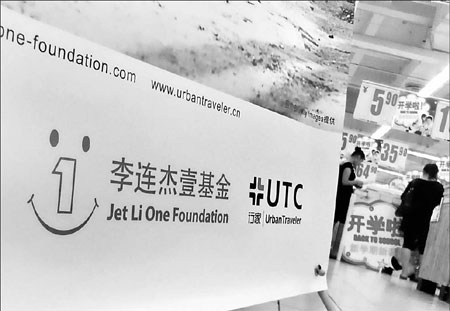Legal constraints hurt charities
Jet Li One Foundation has brought the shared plight of private charity groups in China into the spotlight with rumors of its possible termination.
 |
|
A billboard advertising the Jet Li One Foundation stands at a corner in a shopping center in Shanghai. The foundation's initial aim was to collect charity funds through mobile phones from the general public. However, it seems to be too difficult to make happen because the foundation lacked its own independent bank account. |
Initiated by the actor-turned-philanthropist, One Foundation was founded in 2007 as a charity project under the auspices of the Red Cross Society of China.
According to the kungfu star, the major difficulty facing the charity is its private status, which prevents it from direct public fundraising and constrains its further development. In his words, it is "a kid without an identity".
Wang Rupeng, secretary-general of the Red Cross Society of China, in a blog officially responding to the public over the issue, said: "One Foundation is just a fund, not a foundation, which means it is only an amount of money for special use instead of an organization with independent legal person status."
Wang also wrote about the rumor that One Foundation was going to be terminated. He said it won't be terminated so long as there are deposits in the account, and currently they amount to around 67 million yuan. Wang confirmed that the Red Cross cooperation agreement with One Foundation entered another three-year term automatically on Feb 5.
In China, there are two kinds of foundations - public offerings and non-public offerings. The former is permitted to conduct direct public fundraising and the latter one is only allowed to undertake private fundraising as related laws and rules require.
Wang's statement explained the charity didn't have the legal right to carry out public fundraising as well as other charity programs on its own. All the related charity plans and activities it undertakes need to be sanctioned by the Red Cross Society of China and then undertaken in the society's name.
There were roughly 1,800 foundations in China by the end of 2009 with 991 public offering foundations. The non-public offering foundations grew to more than 800 from the first one in 2004 because of government support and encouragement, according to statistics from the Ministry of Civil Affairs.
Most public offering foundations in China are operated by the Chinese government. The chance for private charity organizations to successfully apply to become one is limited, according to charity insiders in China.
The number of charitable organizations in the United States is 1.5 million. That figure includes 90,000 foundations but of them less than 1 percent is qualified to conduct public fundraising.
In some states, these organizations are allowed to launch public fundraising once they get administrative permission from the US government.
The current number of public offering foundations is ample, said Liu Zhongxiang, an official in charge of foundations with the Ministry of Civil Affairs. He said it might cause public aversion to charitable fundraising if the number continued to grow.
That doesn't mean the government would decline any application from private charity groups, especially the best, he added.
Many private charity groups in China are in the same situation as One Foundation now.
"We always have to compromise on our charity program when taking our sponsors' requirements into account, since government and enterprises are our main donors," said Bian Jingwen, director of Youreye Service Center for Disabled People, a Shanghai-based private commonwealth organization dedicated to helping the blind and others with eyesight problems. "The consequences ultimately take us far from our previous aim of developing a certain program, which hurts the independence of our development." One Foundation's initial aim was to collect charity funds through mobile phones from the general public. It proved to be too difficult to realize because it lacked its own independent bank account, according to Jet Li.
Nonetheless, the government's strict controls over the numbers of public offering foundations are not without reason because it has to protect public enthusiasm for charity, Bian also said.
"I think transparency is the most important thing when it comes to charity in China, said Rong Bo, general manager of Southern Weekend, a popular newspaper in China.
"It is a transitional period both for One Foundation and China's charity-related legislative system," said Wang Zhenyao, head of Beijing Normal University's One Foundation Community Research Institute. He is also former director of the Social Welfare and Charity Department under the Ministry of Civil Affairs.
 0
0 






